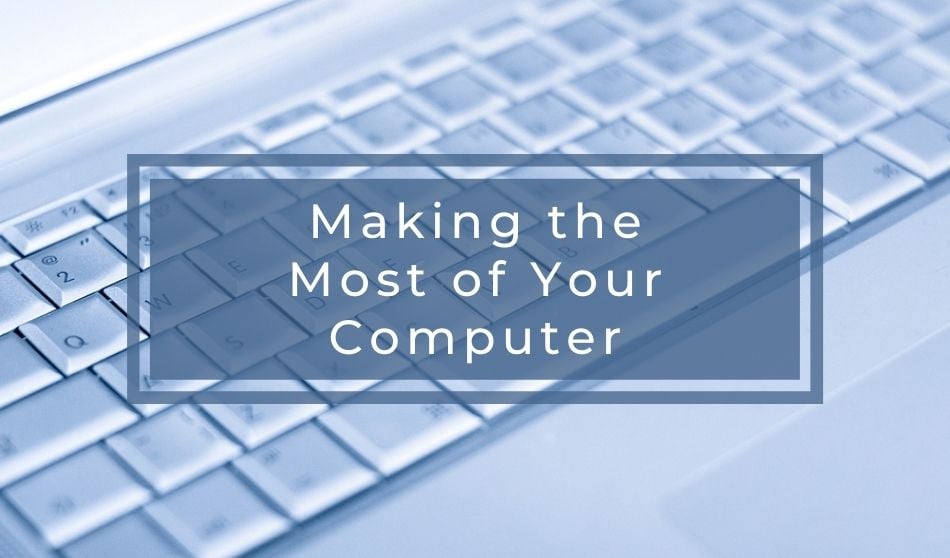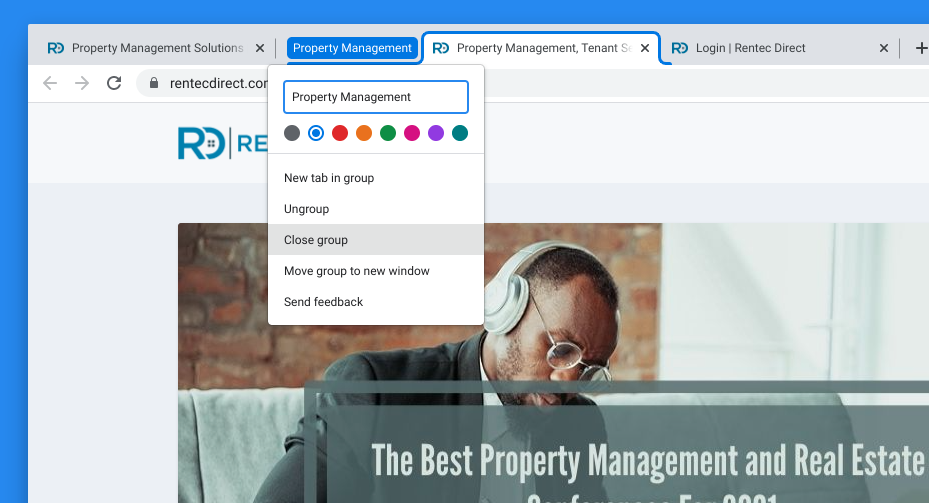
You’re running a business and juggling many hats — your computer should be a useful tool that brings time savings, not headaches. Keyboard shortcuts, hotkeys, and computer hacks to the rescue.
I don’t know when I first learned how to copy and paste text from one document to another, but it was a game-changer to be sure. WIth eyes-opened, I wondered what else my computer could do to make my tasks easier and save time.
Whether you’re tech-savvy or tech-cautious, take a quick peek at these handy computer tricks and tips – you may find some new ones to add to your toolkit to help you shave time from repetitive tasks.
How to Pin Frequently Used Apps to a Taskbar
Before looking at word processing tricks you can do within a document or spreadsheet or other application tips, the desktop is a great place to start realizing some time savings.
Your taskbar (usually located at the bottom of of your computer screen) is prime real estate for adding your most frequently used applications and folders. No more hunting for that folder or tool, if you place it on your taskbar, a simple click will open it and have you on your way to productivity.
Windows
To add an app or folder to your taskbar in on a Windows computer, right-click the application icon on your desktop and choose Pin to taskbar from the menu
You can also open the Start menu, right-click and choose More and then Pin to taskbar or drag the icon to the taskbar.
To remove an item, right-click and choose Unpin from taskbar.
Chromebooks
Chrome OS is a little different. Click the circle in the lower-left corner and then the up arrow at the top (looks like this ^). From there, right-click any item to Pin to shelf.

How to Make a Desktop Shortcut (Icon)
Have you ever wished you didn’t have to open a browser and either type in the URL or hunt through your bookmarks to get to a website you use all the time?
Many different browsers (Firefox,Chrome, Internet Explorer, etc) allow you to turn any website into a quick access icon on your desktop. This can be very handy for accessing sites you use daily.
Note: Some browsers and Chromebook-enabled browsers might not allow shortcuts.
3 easy steps to create a desktop shortcut:
- Re-size your Web browser so you can see the browser and your desktop on the same screen.
- Left-click the icon located to the left side of the address bar (it may appear as a green padlock but it also might appear as a black icon).
- Continue to hold down the mouse button while you drag the icon to your desktop. This creates a shortcut that is clickable to open.
Tip: If you wish, after creating the shortcut you can right-click on the icon on your desktop and select Rename to edit the text description. Also, you can now use the Windows instructions above to place that icon on your taskbar if you wish.
Organize opened documents, browsers, and programs
Throughout the day it’s not uncommon to have dozens of browser tabs, programs, and documents open at the same time. It can get overwhelmingly messy and that cluttered feeling can steal your attention and productivity. Here are a few that may bring you a little peace.
Organize in a Snap
Most computers have hotkeys and shortcuts that allow you to maneuver around your computer environment in ways you might not have known possible.
Definition Corner: What are keyboard shortcuts or hotkeys? They are a combination of pressing multiple keys on your keyboard simultaneously to do a task instead of using a mouse.
Need to have two documents, programs, or tabs open side-by-side? On a PC you can utilize the Windows button on your keyboard together with the left or right arrow keys to snap that item to the corresponding side. For Chromebooks, the Alt key plus bracket key will do the same. Alt+] for right and Alt+[ for left.
Tip: The bracket keys are located on the right side of your keyboard, just below the +/= key.
Organize Browser Tabs
I’ve been guilty of having dozens of tabs open at once but one of the best tricks I’ve learned is grouping the tabs together by task or topic. Using this handy option allows you to switch between tasks easily without the clutter or mental processes of trying to find those tabs related to your immediate project.
Chrome does this exceptionally well. Simply right-click a browser tab and choose Add tab to group. From there you’ll be able to color code and name the group.

Once you’ve added each tab to a group, you can click the group tab to expand or hide those tabs.
Expanded tab view

Hidden browser tabs

A simple click on the Tab Group name will expand and shrink the tab list.
Note: this is not a persistent grouping. If you shut down your computer, only the tabs you’ve set to open on restart (in your settings) will reopen and the tab groups will need to be recreated. Other browsers have this capability as well either stand-alone or by downloading an extension.
Other Computer Hacks
A few more favorites when it comes to navigating your computer efficiently come to mind.
Delegating tasks
Spend some quality time in looking at your email settings. Not only are there options to sort and prioritize your email but you can easily have email forwarded to the appropriate person to handle certain tasks.
For example, if you are a private landlord and have maintenance issues and repair requests come in from a tenant portal or property management software you can create message rules in your settings to forward those to the appropriate person.
And, if your property management software already filters marketing and maintenance email to the appropriate person, you could use your email settings to forward your copy to it’s own folder/label to help your inbox stay organized.
Keeping your computer secure
Whether you need to step away from your desk for a moment or for the day, being able to protect access to your computer is very important. We get up multiple times a day and the time it takes to grab the mouse and lock or ‘sleep’ your computer can really add up. Instead, try using this combo:
PC: Windows key + L
Chrome: Search key + L
Mac: Control+Command+Q
Data-entry and Word Processing
Keyboard shortcuts aren’t the only time savers. Within almost every word processing application (such as Google Docs) you can find a plethora of tricks to make your work simpler. For example, most word processing applications have a text-to-speech option that allows you to dictate instead of type. Talking is at least three times faster than typing so why not take advantage of that, especially when composing longer documents and correspondence.
Incognito
If you haven’t used Incognito mode before, you may want to give it a try. Incognito might also go by Private browsing in some browsers. This useful hack isn’t just about online anonymity but can be very useful if you need to view multiple instances of a log-in that typically only allows one. For example: if you want to have your property management software open and take a look at a tenant portal account, incognito to the rescue. Using Incognito lets you stay logged into both accounts at the same time.
FYI: Routers, ISPs, your boss, and more still have access to your online activity even when browsing incognito.
Where do I find more computer shortcuts and tricks?
Depending on the type of computer and browser used, there are hundreds of options to utilize time-saving keyboard shortcuts and customizations.
Chromebook
If your using a Chromebook click Ctrl+Alt+/ (forward slash) at the same time to see an entire keyboard shortcut list. It is organized by type and searchable. You can learn more directly from Chromebook Help here: Chromebook keyboard shortcuts
WIndows PC
If on a Windows computer there are different hotkey lists depending on the Windows operation system you run. A complete list can be found here: Keyboard shortcuts in Windows
Mac (Apple Computers)
Mac users have their own set of keyboard shortcuts that can be found here: Mac Keyboard Shortcuts
Whether you dive into your computer customization options, email filtering and sorting, or start using keyboard shortcuts and hotkeys — taking a little time to become familiar and trying out some of these options may change the relationship you have with your computer. You may find yourself less frustrated with the added bonus of having a little more time on your hands.
RELATED READING FOR YOU:
- Tips and Tricks | 5 Days to an Organized Office
- Fall Decluttering for Renters
- Technologies to Simplify Property Management Compliance





